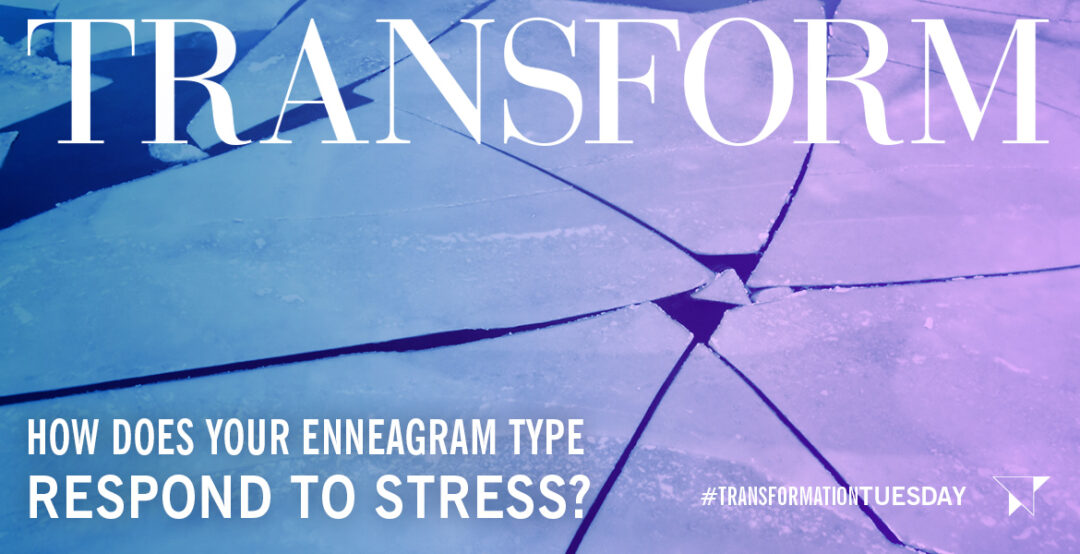How does your Enneagram type respond to STRESS?
When some people are stressed, you know it immediately. With others, you wouldn’t know unless they say they are stressed. At times, it’s difficult to identify that we may indeed be stressed ourselves. In studying the Enneagram, we learn that what causes stress and how one reacts to it differ by the 9 Enneagram Types. The first step is to acknowledge when each of us is stressed, and the way to do that is to become familiar with the cues and signals that show up when we are stressed. Stress typically shows itself in one or more of our 3 Centers – Head, Heart and Body. Do you know your cues and signals?
Below are descriptions of some cues and signals that you might notice when you are stressed. Send us others that you notice for your Enneagram Type. We’d love to expand our descriptions.
1 – Perfectionist
Compulsive, Depressed, Indecisive
Type Ones become compulsive about work. The inner critic heightens. They focus on controlling emotions. Anger (disguised as frustration) rises. They exhibit classic Type A behavior. Black/white thinking intensifies. Decision making and delegating is difficult. They fear that personal flaws will be revealed and that they don’t measure up. Depression and grief come up, and they question the value of work that can lead to growth.
2 – Giver
Resentment, Hysteria, Impatience
Type Twos’ thoughts and emotions go to resentment. Their attention is on the other person and what they aren’t doing for or giving back to the Two. They resent other people for ingratitude. When stressed, Twos’ emotions are heightened and visible (hysterical). Tears may well up unexpectedly. They are impatient.
3 – Performer
Spacey, Sleepy, Insecure
Type Threes space out and sleep a lot. They throw energy at trivia, question their self-worth, blame fate – “nothing I could do about it.” Stressed-out Threes are unable to function at their usual pace. They may rev up for a period of time but then collapse, usually because a physical issue arises that makes them slow down or because a failure has occurred.
4 – Romantic
Withdrawn, Extremist, Emotional
Type Fours move towards others. Push/pull energy heightens – energy moves intensely toward what they think they want, and what is missing, and then may immediately pull back when what they thought they wanted turns out to not fulfill their emotional void. They can become more depressed/withdrawn and stressed, then demand attention from others, usually through expression of intense emotions and words.
5 – Observer
Frantic, Scattered, Nervous
Type Fives hold their stress internally. Often not visible, it may cause them to withdraw even more than usual. A happy-go-lucky façade hides inner tension. They feel a nervous inner buzz – a flood of information, an inability to think clearly or to relax. Under stress, Fives feel overwhelmed with too many choices and may appear scattered and frantic for quick-fix solutions to buy time and save resources.
6 – Loyal Skeptic
Anxious, Inquisitive, Unsettled
For Type Sixes, unclear rules and guidance create stress. Stress increases the possibility of danger, and fight or flight is triggered when high levels of tension are present. Their overactive imaginations can create worst-case scenarios and lead to unnecessary strain. Stressed Sixes seek out advice and ask a lot of questions. They get really busy as a way to avoid thinking about their fears and doubts.
7 – Epicure
Judgmental, Exact, Narrow-minded
Type Sevens turn their attention to comparing themselves with others. A judging, critical mind takes over. Their focus centers on the inability to have or get something, on having or not having versus right or wrong. They pay attention to every detail and micromanage things and others. They are no longer fun to be around; rather, they are picky and critical.
8 – Protector
Invincible, Strong, Dependable
Type Eights experience heightened anger and control issues. They have a high tolerance for stress and may appear to thrive in it but may withdraw as stress and the feeling of lack of control continue to increase. Eights feel as if they can handle anything, denying stress until it comes out physically, which often results in “pulling away” until they are able to recharge. Feeling vulnerable or exposed also can cause them to withdraw.
9 – Mediator
Paralyzed, Numb, Defeatist
Type Nines feel a sense of paralysis – there is so much to do; yet every task has equal priority, making it challenging to get any one task done. The potential for conflict can cause stress, which causes this Type to go into their heads and fall into obsessive thinking, running through every possible scenario for how to avoid the conflict. Stressed Nines may look stubborn or act passive aggressively and can appear busy as a way of avoiding the discomfort they are feeling. They often shift blame to others. They frequently feel taken advantage of yet have difficulty taking action on behalf of self.




